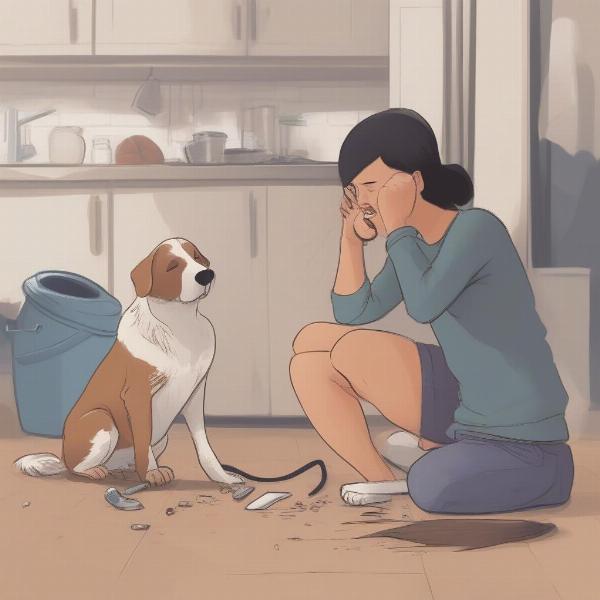It’s a phrase whispered in frustration, typed into search bars late at night: “I hate our dog.” This sentiment, though uncomfortable, is more common than you might think. Feeling overwhelmed, frustrated, or even resentful towards your dog doesn’t make you a bad person. It simply means you’re struggling, and understanding why is the first step towards finding a solution. This article will explore the reasons behind these feelings and offer practical advice for rebuilding a positive relationship with your furry friend.
Why Do I Feel This Way?
Several factors can contribute to negative feelings towards your dog. Perhaps their behavior has become unmanageable, with constant barking, chewing, or house soiling. Maybe the initial excitement of bringing a dog home has worn off, and you’re now grappling with the realities of pet ownership, like early morning walks and unexpected vet bills. Lifestyle changes, such as a new baby, a demanding job, or moving to a smaller space, can also add stress to the human-animal bond. It’s important to identify the root cause of your frustration to address it effectively.
 Frustrated Dog Owner
Frustrated Dog Owner
Unrealistic Expectations
One common reason people struggle with dog ownership is unrealistic expectations. We often romanticize the idea of having a dog, envisioning cuddly companions and effortless walks in the park. The reality, however, can be quite different. Dogs require training, patience, and consistent effort. If your dog isn’t behaving as you envisioned, it’s important to adjust your expectations and focus on building a relationship based on reality, not idealized notions.
Lack of Training and Socialization
A poorly trained dog can be a source of constant stress. Excessive barking, jumping, and pulling on the leash can make even simple outings a nightmare. Similarly, a lack of socialization can lead to fear-based aggression or anxiety, further complicating the relationship. Investing in professional training and socialization can significantly improve your dog’s behavior and your overall experience.
Finding Solutions and Rebuilding the Bond
If you’re feeling overwhelmed by your dog, remember that there is help available. Professional dog trainers can assess your dog’s behavior and create a customized training plan. A veterinarian can rule out any underlying medical conditions that may be contributing to behavioral issues. Don’t hesitate to reach out to these professionals for guidance and support.
Seeking Professional Help
Sometimes, the best course of action is to seek professional help. A certified dog trainer or behaviorist can provide personalized guidance based on your dog’s specific needs and your lifestyle. They can help you understand your dog’s behavior, teach you effective training techniques, and develop a plan to address any underlying issues. This can make a world of difference in your relationship with your dog.
Honest Self-Reflection
Take some time to reflect on your own role in the relationship. Are you consistently enforcing rules? Are you providing enough mental and physical stimulation? Are you meeting your dog’s basic needs? Honest self-reflection can be difficult, but it’s essential for identifying areas where you can improve.
Conclusion
Feeling like you “hate our dog” is a distressing experience, but it doesn’t have to be a permanent one. By understanding the underlying causes of these feelings and taking proactive steps to address them, you can rebuild a positive and fulfilling relationship with your furry companion. Remember, seeking professional help is a sign of strength, not failure. With patience, understanding, and the right support, you can transform your relationship with your dog from one of frustration to one of love and companionship.
FAQ
- Is it normal to feel resentful towards my dog sometimes? Yes, it’s completely normal to have moments of frustration or resentment. Dog ownership is challenging, and it’s okay to acknowledge these feelings.
- What should I do if my dog’s behavior is driving me crazy? Consult with a certified dog trainer or behaviorist for personalized guidance and training strategies.
- Can a veterinarian help with behavioral issues? Yes, a veterinarian can rule out any underlying medical conditions that may be contributing to the behavior problems.
- How can I find a qualified dog trainer? Ask your veterinarian for recommendations or search online for certified dog trainers in your area.
- What if I’ve tried everything and still feel overwhelmed? Consider reaching out to a dog rescue or rehoming organization. Sometimes, finding a more suitable home for your dog is the best option for both of you.
- Is it wrong to rehome a dog? No, it’s not inherently wrong. Sometimes, rehoming is the most responsible decision for both the dog and the owner. It’s important to prioritize the well-being of everyone involved.
- How can I prevent these negative feelings in the future? Realistic expectations, consistent training, and proactive management of your dog’s needs can help prevent future frustrations.
Related Articles:
About ILM Dog:
ILM Dog is your trusted international resource for expert advice on all aspects of dog care and nurture. From breed selection and puppy care to senior dog health and behavior training, we provide evidence-based information to empower dog owners worldwide. We offer guidance on a wide range of topics, including dog health, nutrition, grooming, and product recommendations. For professional support tailored to your dog’s individual needs, contact us at [email protected] or call us at +44 20-3965-8624.